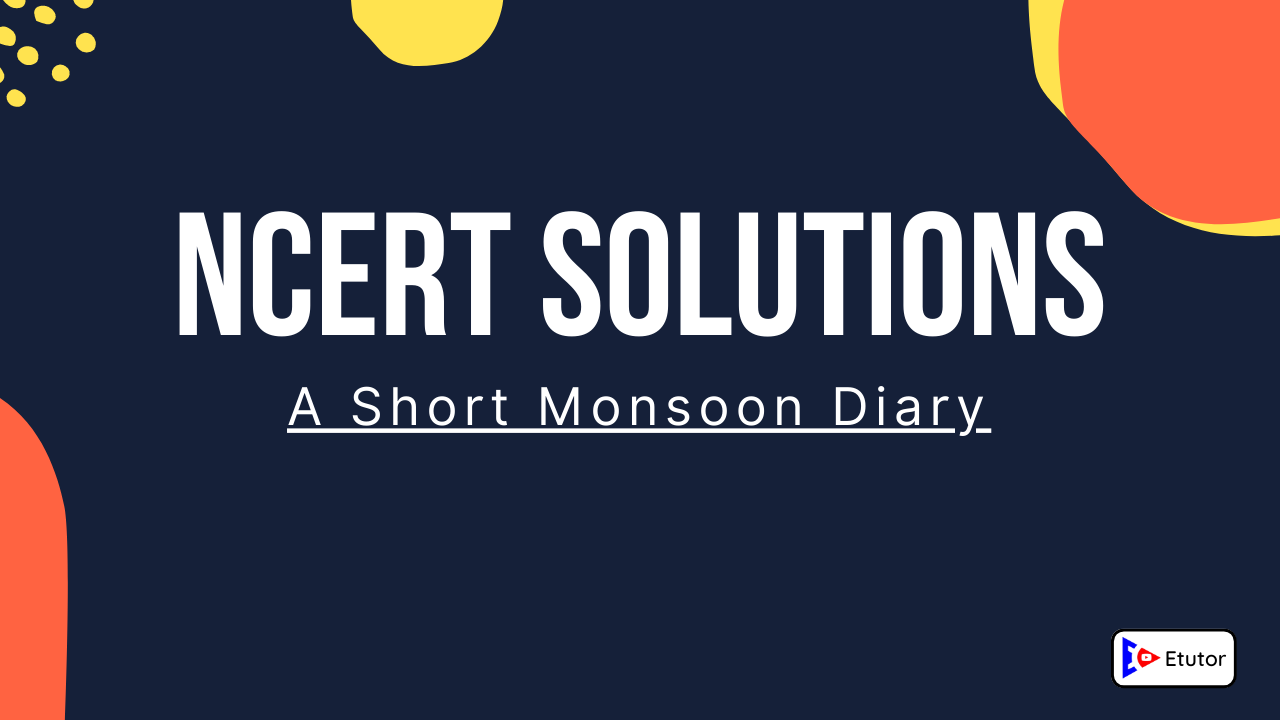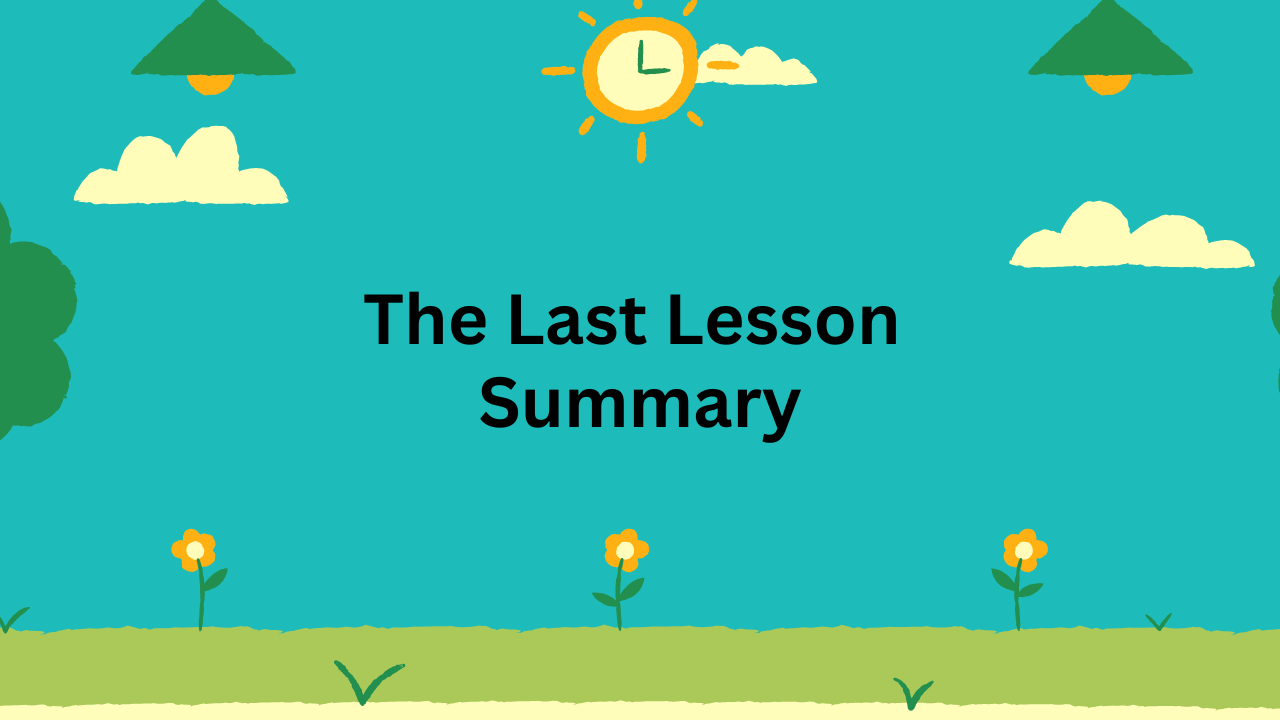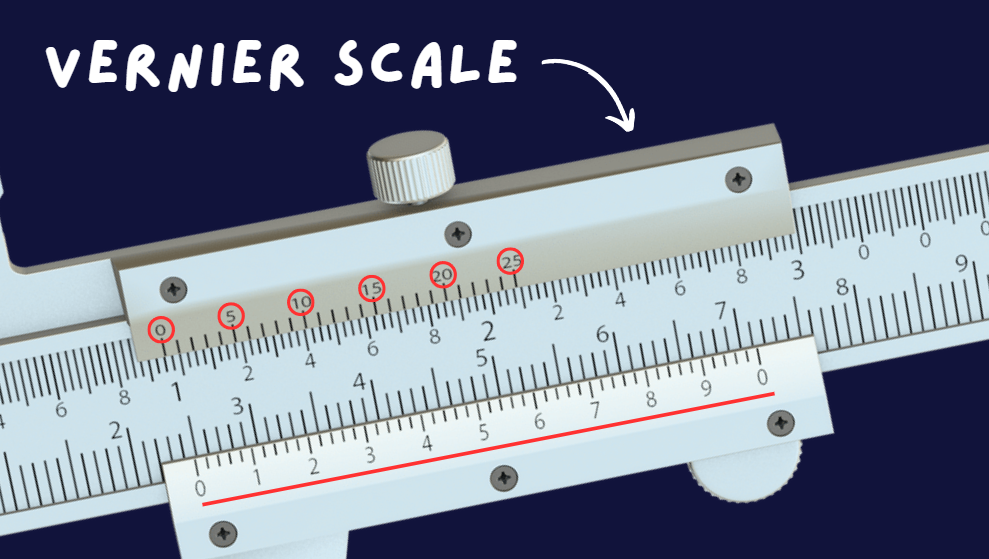NCERT Solutions Class 8 English Honeydew Chapter 8 A Short Monsoon Diary

Etutor Guru
21 Aug 2023
Comprehension check:-
Q 1. Why is the author not able to see Bijju ?
Ans. The mist all around prevents the author from seeing Bijju.
Q 2. What are the two ways in which the hills appear to change when the mist comes up ?
Ans. The author is unable to see Bijju due to the surrounding mist.
Comprehension check:-
Q 1. When does the monsoon season begin and when does it end ? How do you prepare to face the monsoon ?
Ans. Beginning at the end of June and lasting through the first week of October is the monsoon season. We purchase raincoats and umbrellas to prepare for the monsoon.
Q 2. Which hill-station does the author describe in this diary entry ?
Ans. In this diary entry, the author describes the hill town of Mussoorie.
Q 3. For how many days does it rain without stopping ? What does the author do on these days ?
Ans. It doesn’t stop raining for eight or nine days. There is nowhere the author can go. He paces the space while gazing out the window at some swaying umbrellas. It doesn’t stop raining for eight or nine days. There is nowhere the author can go. He paces the room looks out of the window at a few bobbling umbrellas.
Q 4. Where do the snakes and rodents take shelter ? Why ?
Ans. In roofs, attics, and godowns, snakes and rodents find refuge. They act in this way because rainwater has flooded their burrows and holes.
Q 5. What did the author receive in the mail ?
Ans. A cheque was mailed to the author.
Working with the text:-
Q 1. Look carefully at the diary entries for June 24-25, August 2 and March 23. Now write down the changes that happen as the rains progress from June to March.
Ans. The first day of monsoon mist is June 24. The hills are hidden, and silence is cloaks them as well. Warm and humid early monsoon rain arrives on June 25; a steady, nonstop downpour without a storm or thunder arrives on August 2. Winter comes to an end on March 23.
Q 2. Why did the grandmother ask the children not to kill the Chuchundar ?
Ans. The grandmother claims that Chuchundars are fortunate and bring money. She then begged the kids to refrain from killing the Chuchundars.
Q 3. What signs do we find in Nature which show that the monsoons are about to end?
Ans. The monsoons are about to end because the cobra lily seeds are turning red.
Q 4. Complete the following sentences.
(i) Biiju is not seen but his voice is heard because ………
(ii) The writer describes the hill-station and valley as ……
(iii) The leopard was successful in …….. but had to flee when ……..
(iv) The minivets are easily noticed because ……
(v) It looks like a fashion display on the slopes when …..
(vi) During the monsoon season , snakes and rodents are found in roofs and attics because ……..
Ans.
(i) Biiju is not seen but his voice is heard because of the monsoon mist.
(ii) The writer describes the hill-station and valley as “a paradise that might have been”.
(iii) The leopard was successful in lifting the dog but had to flee when Bijju’s mother came screaming imprecations.
(iv) The minivets are easily noticed because they shine like brilliant jewels.
(v) It looks like a fashion display on the slopes when colourful wild dahlias rear their leads from the rocky crevices.
(vi) During the monsoon season , snakes and rodents are found in roofs and attics because their holes and burrows are flooded with the rain water.
Q 5. “Although tin rools are given to springing unaccountable leaks, there is a feeling of untouched by, and yet in touch with, the rain.
(i) Why has the writer used the word, ‘springing’?
Ans. The writer has used the word ‘springing’ because the water was leaking with the speed three the corrugated tin roof.
(ii) How is the writer untouched by the rain ?
Ans. The writer is untouched by rain because he is in a room.
(iii) How is the writer in touch with the rain at the same time ?
Ans. The writer can hear raindrops hitting his tin roof. He is therefore connected to the rain.
Q 6. Mention a few things that can happen when there is endless rain for days together.
Ans. The majority of people spend their time inside. Some people take joy extended periods of sleep. Kids engage in indoor games. Women spend the majority of their time in the kitchen making cutlets, pakoras, tea, and coffee for the family. The family is in a cheerful and giving frame of mind.
Q 7. What is the significance of cobra lily in relation to the monsoon season , its beginning and end ?
Ans. The cobra lily first appears when the monsoon season is about to start. The monsoon season is coming to an end when its seeds turn read.
Working with the language :-
1. Here are some words that are associated with the monsoon. Add as many words as you can to this list. Can you find words for these in your languages ?
downpour floods mist cloudy powercuts cold umbrella
Ans. Raincoat, mud, pols, frogs, rainbow, lightning, thunder.
2. Look at the sentences below :-
(i) Bijju wandered into the garden in the evening.
(ii) The trees were ringing with birdsong.
Notice the highlighted verbs.
The verb wandered tells us what Bijju did that evening, But the verb was ringing tell us what was happening continually at same time in the past (the birds were chirping in the trees).
Now look at the sentences below. They tell us about something that happened in the past. They also tell us about other things that happened continually, at the same time in the past.
Put the verbs in the brackets into their proper forms. The first one is done for you.
(i) We (get out) of the school bus. The bell (ring) and everyone was (rush) to class.
We got out of the school bus. The bell was ringing and everyone was rushing to class.
(ii) The traffic (stop). Some people (sit) on the road and they (shout) slogans.
(iii) I (wear) my raincoat. It (rain) and people (get) wet.
(iv) She (see) a film. She (narrate) it to her friends who (listen) carefully.
(v) We (go) to the exhibition. Some people (buy) clothes while others (play) games.
(vi) The class (is) quiet. Some children (read) books and the rest (draw).
Ans. (i) The traffic stopped. Some people were sitting on the road and they were shouting slogans.
(ii) I wore my raincoat. It was raining and people were getting wet.
(iii) She saw a film. She was narrating it to her friends who were listening carefully.
(iv) We went to the exhibition. Some people were buying clothes while others were playing games.
(v) The class was quiet. Some children were reading books and the rest were drawing.
3. Here are some words from the lesson which describe different kinds of sounds.
drum swish tinkle caw drip
(i) Match these words with their correct meanings.
(a) to fall in small drops
(b) to make a sound by hitting a surface repeatedly
(c) to move quickly through the air, making a soft sound
(d) harsh sound made by birds.
(e) ringing sound (of a bell or breaking glass, etc.)
Ans. Drip, drum, swish, caw, tinkle
(ii) Now fill in the blanks using the correct form of the words given above.
(a) Ramesh …….. on his desk in impatience.
(b) Rain water …….. from the umbrella all over the carpet.
(c) The pony ….. its tail.
(d) The …… of breaking glass woke me up.
(e) The ….. of the raven disturbed the child’s sleep.
Ans. (a) Ramesh is drumming on his desk in impatience.
(b) Rain water is dripping from the umbrella all over the carpet.
(c) The pony is swishing its tail.
(d) The tinkling of breaking glass woke me up.
(e) The cawing of the raven disturbed the child’s sleep.
4. And sure enough, I received a cheque in the mail.
Complete each sentence below by using appropriate phrase from the ones given below.
sure enough / colourful enough/ serious enough
kind enough / big enough / fair enough
brave enough / foolish enough/ anxious enough
(i) I saw thick black clouds in the sky. And ……….. ………. it soon started raining heavily.
(ii) The blue umbrella was ………. for the brother and sister.
(iii) The butterflies are ……… to get noticed.
(iv) The lady was …….. to chase the leopard.
(v) The boy was ………. to call out to his sister.
(vi) The man was ……… to offer help.
(vii) The victim’s injury was ……… …….. for him to get admitted in hospital.
(viii) That person was ……… to repeat the same mistake again.
(ix) He told me he was sorry and he would compensate for the loss. I said, ……
Ans. (i) I saw thick black clouds in the sky. And sure enough it soon started raining heavily.
(ii) The blue umbrella was big enough For the brother and sister.
(iii) The butterflies are colourful enough to get noticed.
(iv) The lady was brave enough to chase the leopard.
(v) The boy was anxious enough To call out to his sister.
(vi) The man was kind enough to offer help.
(vii) The victim’s injury was serious enough for him to get admitted in hospital.
(viii) That person was foolish enough to repeat the same mistake again.
(ix) He told me he was sorry and he would compensate for the loss. I said, fair enough.

